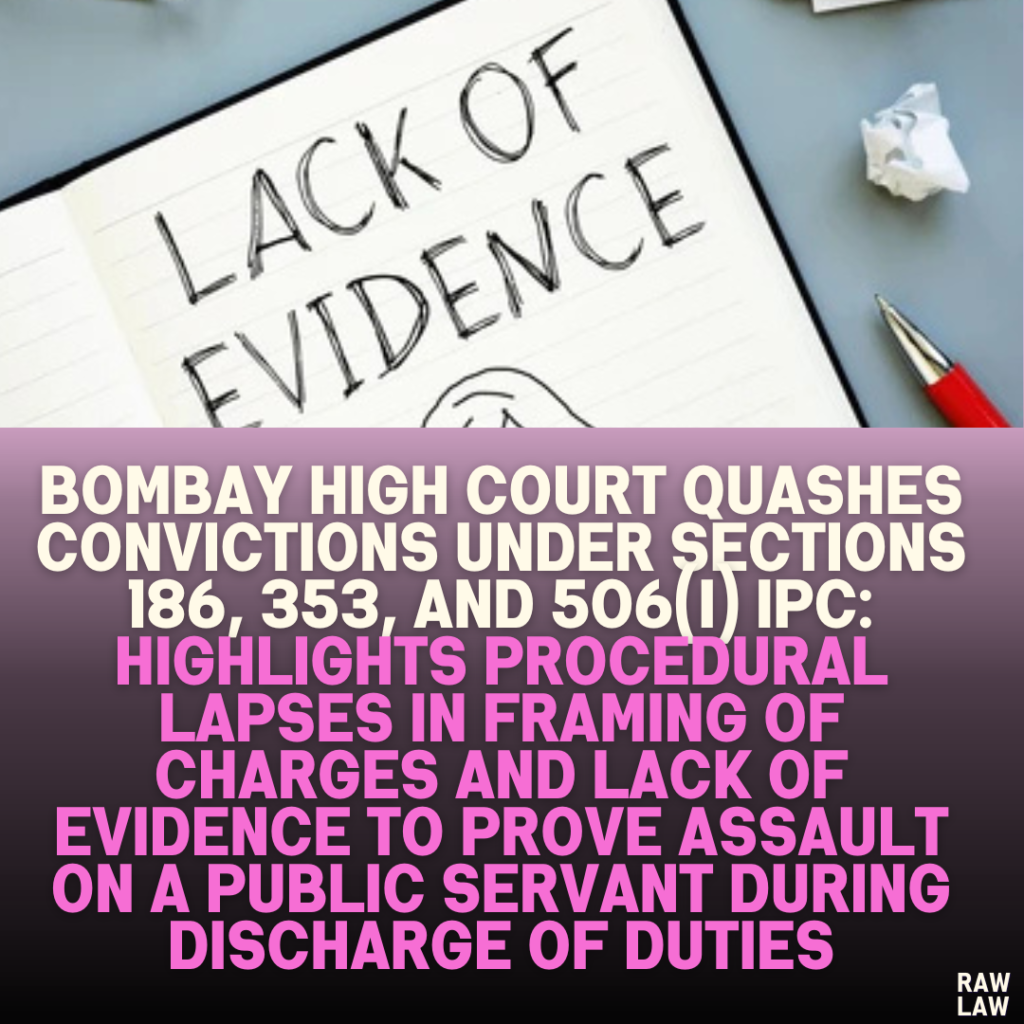Court’s Decision:
The Bombay High Court quashed the conviction of the second appellant (Development Officer) under Section 186 IPC due to procedural errors, specifically the absence of framing of charges and required sanctions under Section 195 CrPC. The first appellant’s (Vice Chairman, Zilla Parishad) convictions under Sections 353 and 506(i) IPC were set aside, while his conviction under Section 323 IPC for causing simple hurt was upheld, with the punishment reduced to a fine of ₹1,000 instead of rigorous imprisonment.
Facts:
- Background:
- The complainant, Sagar Patil, a Block Development Officer at Panchayat Samiti, Bhatkuli, relieved the second appellant (Development Officer, Agriculture Department) from her duties on 6th March 2018 due to unsatisfactory performance.
- The very next day, the Agriculture Development Officer reversed this decision, citing procedural errors in the complainant’s actions.
- Incident:
- On 7th March 2018, the appellants visited the complainant’s office to request reinstatement of the second appellant.
- A heated argument ensued. The first appellant allegedly threw a chair, slapped the complainant, and threatened to set his office on fire. The second appellant was accused of obstructing the complainant in discharging his duties.
- The complainant filed a police report, leading to a chargesheet under Sections 353 (assault on a public servant), 323 (causing hurt), 506(i) (criminal intimidation), and 186 (obstruction of public servant) IPC.
- Trial Court’s Conviction:
- The second appellant was convicted under Section 186 IPC and sentenced to three months’ simple imprisonment.
- The first appellant was convicted under Sections 353, 323, and 506(i) IPC, with rigorous imprisonment for two years, one year, and one year, respectively.
Issues:
- Was the conviction of the second appellant under Section 186 IPC valid without framing specific charges and obtaining prior sanctions under Section 195 CrPC?
- Did the prosecution establish the elements of Sections 353, 323, and 506(i) IPC against the first appellant?
Petitioner’s Arguments:
- Second Appellant:
- The conviction under Section 186 IPC was procedurally flawed because:
- The trial court did not frame charges under this section.
- Section 195 CrPC mandates prior sanction for prosecution under Section 186 IPC, which was absent.
- Section 186 IPC is not a minor offence of Section 353 IPC and requires distinct elements to be proven.
- The prosecution’s evidence did not establish obstruction of the complainant’s official duties.
- The conviction under Section 186 IPC was procedurally flawed because:
- First Appellant:
- Witness testimonies were inconsistent and failed to prove that the first appellant used criminal force to deter the complainant from performing his official duties.
- The alleged threat to set the office on fire was unsupported by contemporaneous records or corroboration.
Respondent’s Arguments:
- The appellants obstructed and assaulted the complainant in his office while he was discharging official duties, justifying their convictions under Sections 353, 323, and 506(i) IPC.
Analysis of the Law:
- Section 186 IPC (Obstruction of Public Servant):
- This section requires proof of voluntary obstruction of a public servant in discharging official functions.
- It is non-cognizable and requires prior sanction under Section 195 CrPC, which was not obtained in this case.
- As per Supreme Court rulings, Section 186 IPC and Section 353 IPC are distinct offences and cannot substitute one another. Section 186 IPC is not a minor offence under Section 353 IPC.
- Section 353 IPC (Assault or Criminal Force to Deter Public Servant):
- To establish this offence, it must be shown that:
- The victim was performing official duties at the time of the assault.
- Criminal force was used to deter or obstruct the victim.
- The complainant’s testimony and other evidence failed to prove these elements.
- To establish this offence, it must be shown that:
- Section 506(i) IPC (Criminal Intimidation):
- A threat must be intentional and cause alarm to the victim.
- The complainant’s claim that the first appellant threatened to set his office on fire was inconsistent and uncorroborated by other evidence.
- Section 323 IPC (Causing Hurt):
- The complainant’s medical report confirmed injuries consistent with his claims of being slapped and manhandled.
- This section does not require the public servant to be performing official duties.
Precedent Analysis:
- Durgacharan Naik v. State of Orissa (1966):
- Sections 186 and 353 IPC are distinct and cannot be substituted for one another.
- Section 195 CrPC mandates prior sanction for prosecution under Section 186 IPC.
- Murlidhar Virulkar v. State of Maharashtra (2005):
- Conviction under Section 353 IPC requires clear evidence of obstruction of official duties.
- Rajender Datt v. State of Haryana (1993):
- Assault must occur during the execution of official duties to attract Section 353 IPC.
Court’s Reasoning:
- Second Appellant:
- The trial court erred in convicting her under Section 186 IPC without framing specific charges or obtaining the necessary sanction under Section 195 CrPC.
- The evidence did not establish obstruction of the complainant’s duties.
- First Appellant:
- The prosecution failed to prove the elements of Sections 353 and 506(i) IPC, as the complainant was not performing official duties at the time of the incident, and the alleged threat was unsubstantiated.
- The conviction under Section 323 IPC was upheld based on medical evidence corroborating the complainant’s injuries.
Conclusion:
- Second Appellant:
- Conviction under Section 186 IPC quashed; acquitted of all charges.
- First Appellant:
- Convictions under Sections 353 and 506(i) IPC set aside; conviction under Section 323 IPC upheld with reduced punishment of a ₹1,000 fine.
Implications:
- This judgment underscores the importance of procedural compliance, particularly in framing charges and obtaining prior sanctions for prosecuting non-cognizable offences like those under Section 186 IPC.
- It reiterates that convictions under Sections 353 and 506(i) IPC require clear evidence of obstruction or intimidation of public servants during the discharge of their official duties
